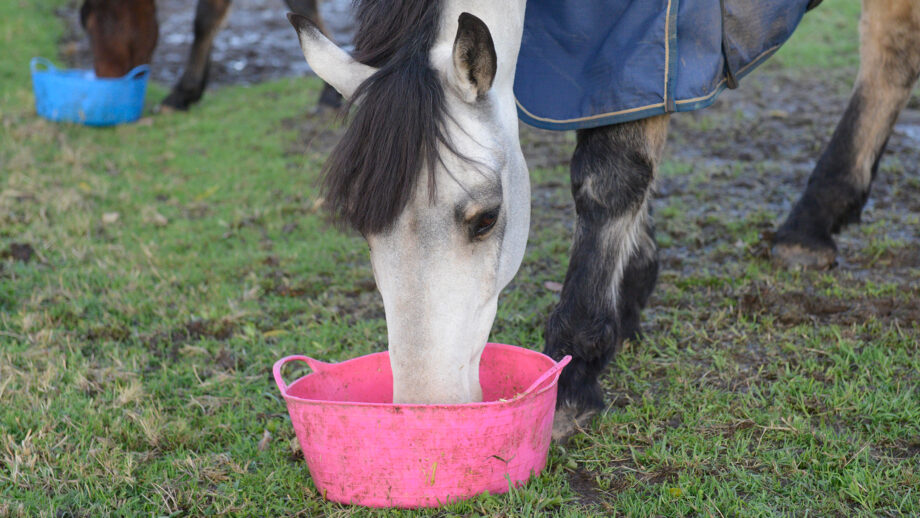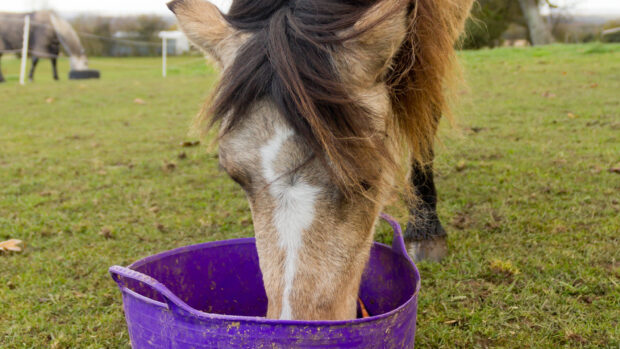Adding one of the best oils for horses to your horse’s feed is a low-cost supplement, however it’s important to understand the reasons for including it, the benefits and which oils are best. Horses digest oil well, and it is a concentrated source of calories that can help horses gain weight while providing slow-release energy. While oil can be an appropriate energy source for excitable horses who might hot up on traditional starch-based diets, conversely it’s not recommended for overweight horses or good-doers. Additionally, a high-oil diet should be balanced with antioxidants (usually vitamin E) to minimise oxidative damage.
The benefits of oil
- To provide essential fatty acids (EFAs), which are useful for general health and vitality
- To add body condition. Oil is very energy dense, having nearly three times the number of calories as carbohydrate. Just 300ml of oil provides the same amount of calories as a kilo of oats. As it is easily digested and absorbed, it is an excellent way to maintain weight
- As an energy source. Oil is a very accessible source of muscle fuel for horses, particularly those in endurance-type work. Due to its relatively slow breakdown, it’s ideal for horses that tend to “fizz up” or tie-up on cereal starch, also avoiding other health risks associated with cereal diets, such as gastric ulcers and laminitis
- To boost coat condition in healthy horses
- To relieve stiff joints and arthritis in older horses. However, oil levels should be reduced if the horse has liver problems.
Does my horse need extra oil?
If your horse is prone to weight gain, then definitely not. However, for horses needing to put on weight it is a great way of increasing the calories and providing slow-release energy when his maximum meal size has been reached, or you want to go easy on the starch content.
“If you have a horse that struggles with weight gain, has a small appetite or is a picky eater, adding oil can work really well to help keep meal sizes small but pack in the calories to help with weight gain,” says Saracen nutritionist Stephanie George. “But additional oil isn’t necessary for all horses as it is so calorie-dense, so consider the type of horse you have before adding it to the diet.”
NAF head nutritionist Kate Hore points out that “in the horse’s natural diet, grass is actually a great source of omega fatty acids”.
“Grass contains around 3–5% fat, and provides more Omega 3 than Omega 6, which is preferable, which explains why our horses’ coats naturally shine in summer,” she says. “Levels are lower in preserved forage and poor in cereals. Therefore, particularly if your horse does not have access to fresh grass growth, adding a little oil to the diet can be advised.”
Some horses may benefit from added oil to support their skin and coat health, if they do not already have a skin and coat supplement. Spillers nutritionist Sarah Nelson says: “Although there’s no substitute for a balanced diet and good grooming, a small amount of oil can be the icing on the cake for achieving the ultimate show ring shine.”
Sarah points out that, “if fed the appropriate amount of feed and/or feed balancer, many horses don’t need additional oil”, and warns that the “difference in cost between adding larger amounts of oil and switching to a higher oil feed may be negligible”.
Which oil should I feed?
Some owners buy their horse’s oil at the supermarket while others choose specialist feed merchants. There’s a bewildering array of linseed, rapeseed, sunflower, soya and marine – which is best?
“All oils are definitely not created equal,” says Kate. “They all provide the same energy density but differ in their ratios of Omega 3 and 6 fatty acids. Omega 3 is naturally anti-inflammatory, while Omega 6 is pro-inflammatory, although that isn’t always a bad thing, such as in triggering immune responses to speed up wound healing. However, we definitely want a positive ratio with more Omega 3 than 6.”
Kate acknowledges that although marine oil, such as cod liver, is good for joint health, “not all of use choose to feed it to horses, whether on ethical grounds of over-fishing, or that we don’t believe it be part of the natural equine diet”.
“At NAF, we advise either choosing linseed, which is naturally high in Omega 3, or a linseed-based Omega blend, to give a positive ratio with more Omega 3 than 6 but the benefits of both. Supermarket vegetable oil is nearly always rapeseed or sunflower, and both are very low in Omega 3 and middling to high in Omega 6. The balance is pro-inflammatory, certainly not the way we want to go.”
Spillers’ Sarah Nelson says: “Some owners prefer linseed oil [because of the Omega ratios] but the ideal Omega 3: Omega 6 ratio has not been established in horses. Some horses also find linseed oil less palatable. The quality of the oil fed (it should be human-grade) is more important than type, with corn, rapeseed and linseed all being suitable options. Regardless of the type of oil you choose, speak to a nutritionist before feeding more than 100ml/day to ensure your horse’s diet provides a sufficient level of vitamin E.”

NAF Linseed Oil | Amazon.co.uk
This pure, cold-pressed linseed oil supports general health and helps to maintain a rich, natural shine to the coat.
The main reason for not buying your horse’s oil in the supermarket is because of the risk of contamination.
“We cannot expect the supermarket to be concerned about a positive test in a competition horse, and they won’t be monitoring for Naturally Occurring Prohibited Substances [NOPS] so the risk of accidental contamination is always there,” warns Kate, while Sarah adds: “If your horse is competing, opt for an equine product that is BETA NOPS approved.”
However, it’s worth remembering that oil doesn’t just come in a bottle. Pellet oil in a rice-bran supplement, such as Saracen’s Equi-Jewel (which you can find on Amazon), may be a better choice for those feeding a lot of oil.
“It takes the messiness away from feeding large quantities of oil and helps increase palatability,” says Stephanie. “Liquid oil goes rancid quickly when exposed to air and light, whereas pelleted oil is stabilised, so it keeps for longer.”
Specialist forms of oil in pelleted options and fish oil specifically for horses are available in feed stores.
How much oil should I feed?
Spillers recommend adding oil at a rate of up to 100ml per 100kg bodyweight (500ml per day for a 500kg horse). However, although horses metabolise oil well, you must always introduce additional oil gradually, approximately 100ml per week as a guide.
It can take up to 12 weeks for horses to adapt to a high-oil diet.
A high-oil diet must be balanced with antioxidants, such as vitamin E. NAF recommends 1 IU (international unit) of supplementary vitamin E for every millilitre of oil fed.
You may also be interested to read…

Feeding a horse for weight gain — don’t miss this expert advice
If you want to find out more about feeding a horse for weight gain, make sure you read this advice

15 feeds to help your horse gain weight and condition

How to calculate your horse’s body condition score – is he the right weight?

Subscribe to Horse & Hound magazine today – and enjoy unlimited website access all year round
Horse & Hound magazine, out every Thursday, is packed with all the latest news and reports, as well as interviews, specials, nostalgia, vet and training advice. Find how you can enjoy the magazine delivered to your door every week, plus options to upgrade your subscription to access our online service that brings you breaking news and reports as well as other benefits.




